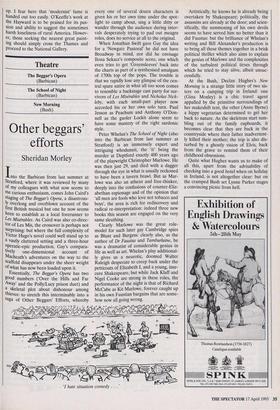Theatre
The Beggar's Opera (Barbican) The School of Night (Barbican) New Morning (Bush)
Other beggars' efforts
Sheridan Morley
Into the Barbican from last summer at Stratford, where it was reviewed by many of my colleagues with what now seems to me curious enthusiasm, comes John Caird's staging of The Beggar's Opera, a disastrous- ly overlong and overblown account of the first British musical but one he now seems keen to establish as a local forerunner to Les Miserables. As Caird was also co-direc- tor of Les Mis, the crossover is perhaps not surprising: but where the full complexity of Victor Hugo's novel could well stand up to a vastly cluttered setting and a three-hour Operatic-epic production, Gay's compara- tively one-dimensional account of Macheath's adventures on the way to the scaffold disappears under the sheer weight of what has now been loaded upon it. Essentially, The Beggar's Opera has two good numbers (`Over the Hills and Far Away' and the Polly/Lucy prison duet) and a skeletal plot about dishonour among thieves: to stretch this interminably into a saga of Other Beggars' Efforts, whereby every one of several dozen characters is given his or her own time under the spot- light to camp about, sing a little ditty or wander through the audience during inter- vals desperately trying to pad out meagre roles, does no service at all to the original.
When Jonathan Swift gave Gay the idea for a `Newgate Pastoral' he did not have Broadway in mind, nor did he envisage Ilona Sekacz's composite score, one which even tries to get `Greensleeves' back into the charts as part of a synthesised amalgam of 1700s top of the pops. The trouble is that we rapidly lose any glimpse of the cen- tral spare satire in what all too soon comes to resemble a backstage cast party for sur- vivors of Les Miserables and Nicholas Nick- leby, with each small-part player now accorded his or her own solo turn. Paul Jesson as Peachum and Anthony O'Don- nell as the gaoler Lockit alone seem to have some mastery of the right sardonic style. Peter Whelan's The School of Night (also into the Barbican from last summer at Stratford) is an immensely expert and intriguing whodunnit, the 'it' being the murder at Deptford exactly 400 years ago of the playwright Christopher Marlowe. He was then just 29, and died with a dagger through the eye in what is usually reckoned to have been a tavern brawl. But as Mar- lowe was also an atheist and free-thinker, deeply into the confusions of counter-Eliz- abethan espionage and of the opinion that `all men are fools who love not tobacco and boys', the area is rich for rediscovery and radical re-interpretation: indeed three new books this season are engaged on the very same sleuthing. Clearly Marlowe was the great role- model for such later gay Cambridge spies as Blunt and Burgess: clearly also, as the author of Dr Faustus and Tamburlaine, he was a dramatist of considerable genius in life as well as art. Whelan's play additional- ly gives us a neurotic, doomed Walter Raleigh desperate to creep back under the petticoats of Elizabeth I, and a young, inse- cure Shakespeare, but while Jack Klaff and Nigel Cooke are strong in these roles, the performance of the night is that of Richard McCabe as Kit Marlowe, forever caught up in his own Faustian bargains that are some- how now all going wrong.
hate situation comedy . . Artistically, he knows he is already being overtaken by Shakespeare; politically, the assassins are already at the door; and scien- tifically, the summoning of his own devils seems to have served him no better than it did Faustus: but the brilliance of Whelan's writing and Bill Alexander's production is to bring all these themes together in a brisk political thriller which also aims to explain the genius of Marlowe and the complexities of the turbulent political times through which he tried to stay alive, albeit unsuc- cessfully.
At the Bush, Declan Hughes's New Morning is a strange little story of two sis- ters on a camping trip in Ireland: one (Gina Moxley) is a chic travel agent appalled by the primitive surroundings of her makeshift tent, the other (Anne Byrne) a hippy vegetarian determined to get her back to nature. As the skeletons start tum- bling out of the family cupboards, it becomes clear that they are back in the countryside where their father inadvertent- ly killed their mother; the trip is also dis- turbed by a ghostly vision of Elvis, back from the grave to remind them of their childhood obsessions.
Quite what Hughes wants us to make of all this, apart from the advisability of checking into a good hotel when on holiday in Ireland, is not altogether clear: but on the cramped Bush set Lynne Parker stages a convincing picnic from hell.


















































 Previous page
Previous page